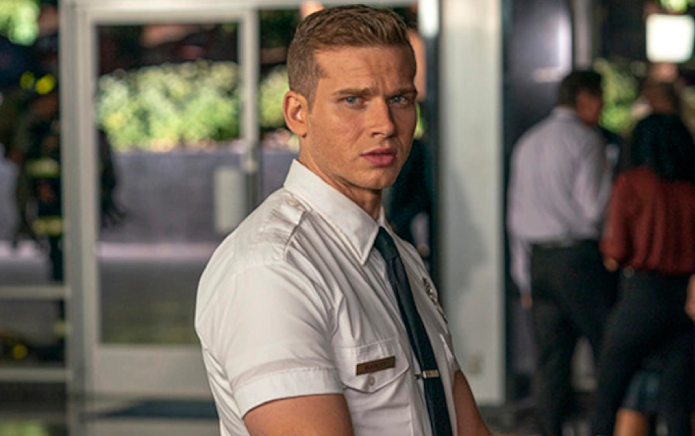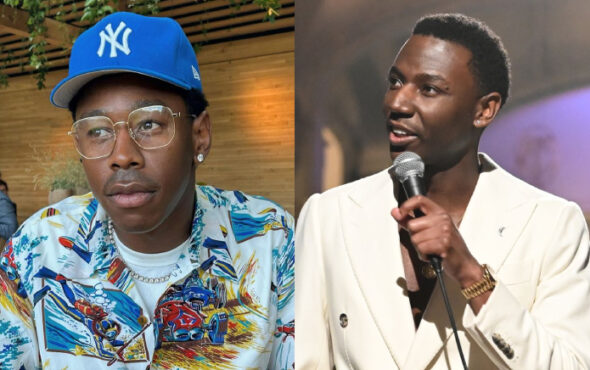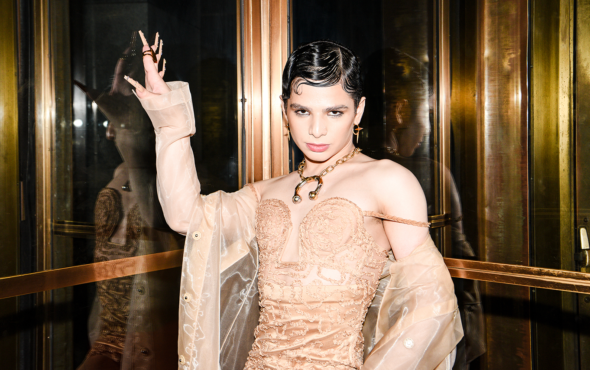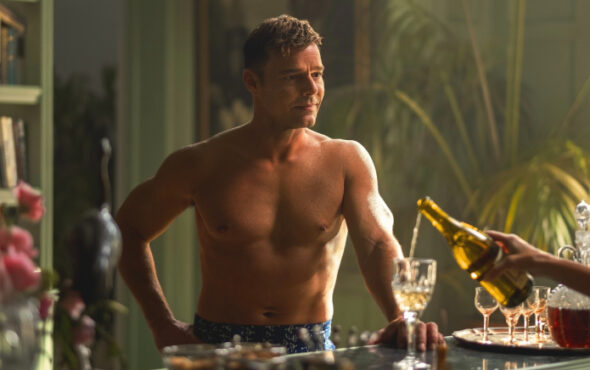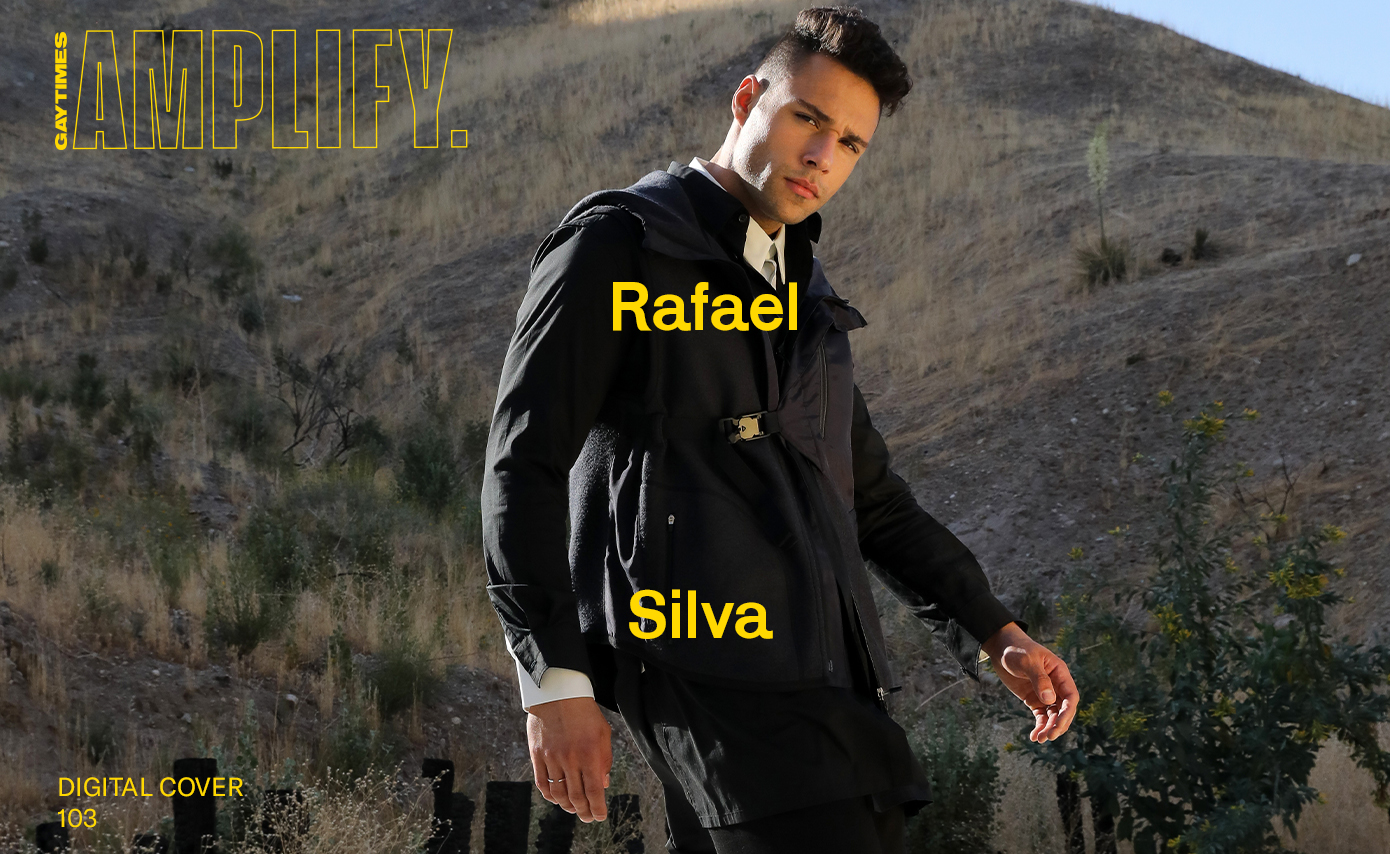
“The diversity and inclusivity of [9-1-1: Lone Star] resonates with people because that’s what the world has always looked like,” states a confident Rafael Silva. “We’ve always looked Indigenous, we’ve always looked Muslim, we’ve always looked Black, we’ve always looked trans – we’ve always looked all these things.” The Brazilian-American actor behind Lone Star’s beloved police officer Carlos Reyes is speaking with GAY TIMES over Zoom as he wraps the second season of the breakout procedural drama. Hailing from queer mastermind Ryan Murphy and his frequent collaborators Brad Falchuk and Tim Minnear, Lone Star focuses on the fire, police and ambulance departments of the fictional Station 126, located in Austin, Texas. The 10-episode first season was a colossal hit in the United States, averaging six million viewers per episode. It became the network’s highest-rated new series of the 2019-20 season, so “colossal” is pretty accurate. The viewership of the series has continued to soar well into its second season – with a third on the way! – which Rafael attributes to the talents of the writers’ room and the diverse array of loveable characters, all of which are unapologetic and unabashed in their identities. “[Lone Star] shows more truth than perpetuated stereotypes of each person, of gay characters, of trans characters, of the Muslim culture, even the Texan culture,” explains Rafael. “It has resonated with a lot of people because it portrays what the world looks like today, and what it’s always looked like.”
We've always looked Indigenous, we've always looked Muslim, we've always looked Black, we've always looked trans - we've always looked all these things.
Alongside Rafael’s character, who is gay and Latino, the central cast also boasts Natacha Karam as Marjan Marwani, a devout Muslim, Ronen Rubinstein as Tyler Kennedy “TK” Strand, a gay man struggling with addiction and Brian Michael Smith, who made history as the first out Black trans man in a series regular role on network television. His character, Paul Strickland, is also trans. For Rafael, the prospect of joining a Murphy production was exciting because, duh, it’s the man behind Glee, American Horror Story and Pose (to name a few) and each of his projects “becomes gold”. More importantly, Murphy has earned a reputation in Hollywood as one of the most inclusive creators with his diverse roster of star-studded entertainers – in front and behind the lens. “It’s his intent. It’s his goal to achieve as much as possible with authenticity,” gushes Rafael.
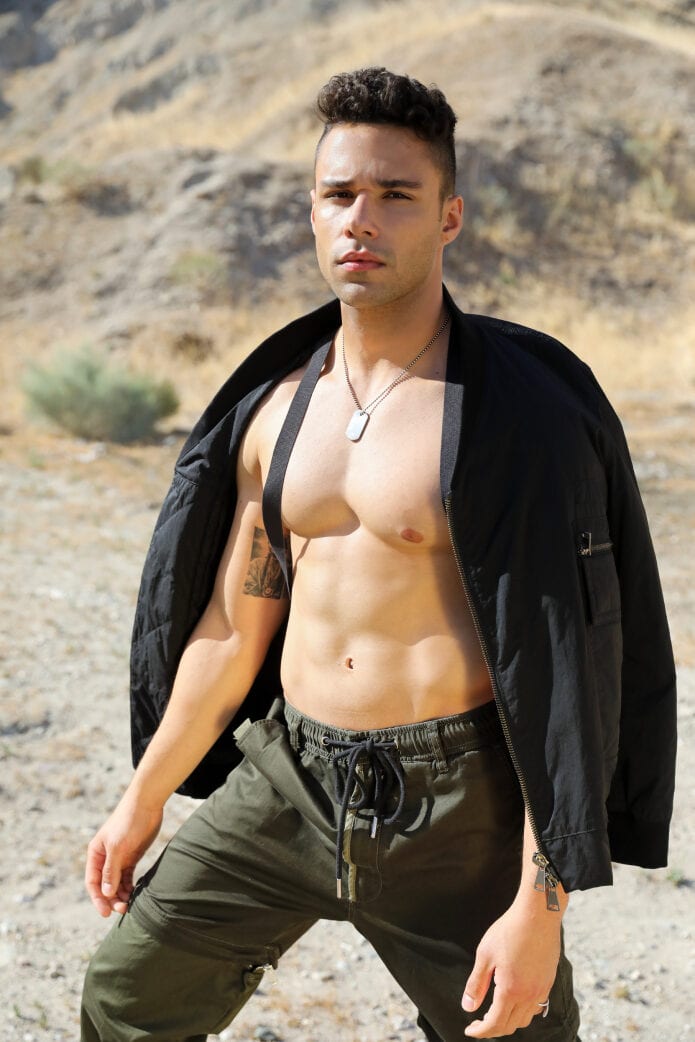
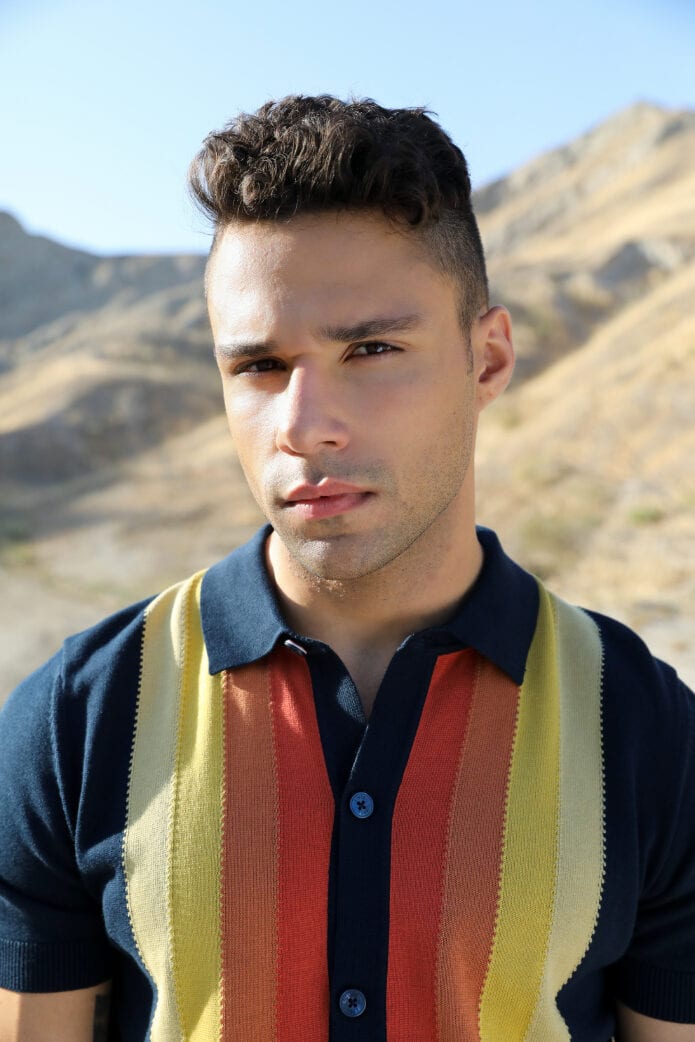
“They say ‘quality over quantity’ but he’s constantly pushing out quality content. Being part of the Ryan Murphy world was a perk. We’re talking about one of the pioneers for inclusivity on television.” Prior to his breakout role as Carlos, Rafael appeared in a handful of short films and made a guest spot on CBS’ political drama Madam Secretary. Striving to make it further in the industry, the 26-year-old embarked on countless auditions in the summer of 2019. It’s clear this was a stressful process for Rafael, who lets out a sigh before reminiscing on that hectic period in his life. He perks up, however, as he remembers the callback from the producers at Lone Star, joking that he couldn’t even remember the audition process or the premise for the show. “It had been a while since I went in, and everything kind of happened immediately. After booking the show, I started filming a week after, so I really had to laser focus and train to be a cop, and just make sure that I was putting my best foot forward,” he says. “It was straight to series and we immediately started shooting multiple episodes at the same time.”
They say 'quality over quantity' but he's constantly pushing out quality content. Being part of the Ryan Murphy world was a perk. We're talking about one of the pioneers for inclusivity on television.
By the end of the first season, Rafael’s character amassed a devout following. Of course, it’d be impossible to pen a piece about Rafael and Lone Star without mentioning ‘Tarlos’, the Brangelina and Bennifer-esque ‘ship’ name for Carlos and Ronen’s character TK, whose romance is – and we’re gonna italicise this now for emphasis – passionately championed by fans on social media. It’s become a weekly occurrence for Tarlos stans to flex their graphic design skills and embrace their inner scriptwriter as they concoct wild (and sometimes steamy) fan-fic ahead of ‘Tarlos Tuesday’ to coincide with the show’s US air date. Honestly, these fans are creative as hell. Unsurprisingly, Rafael lights up when we mention them. Although he had an inkling that Lone Star would be a hit (again, it’s a Ryan Murphy production), the raw passion from the fandom towards the power couple was, and still is, unfathomable for him – but in the best possible way. “Something that really took me by surprise is how passionate the fans are to write rather extensive storylines, situations and themes,” laughs Rafael.
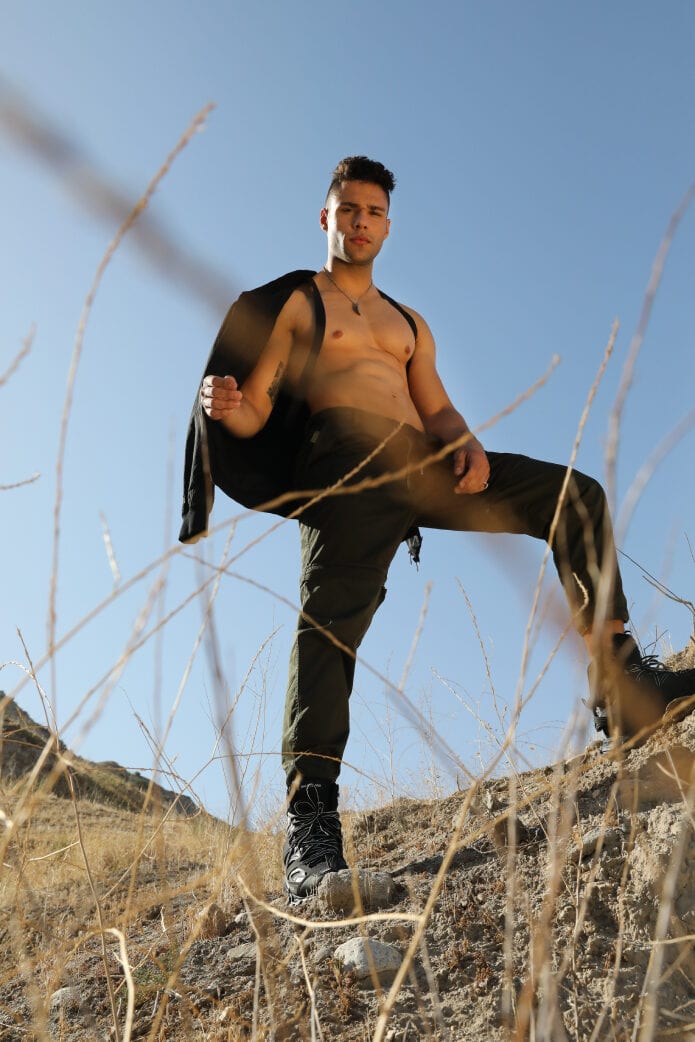
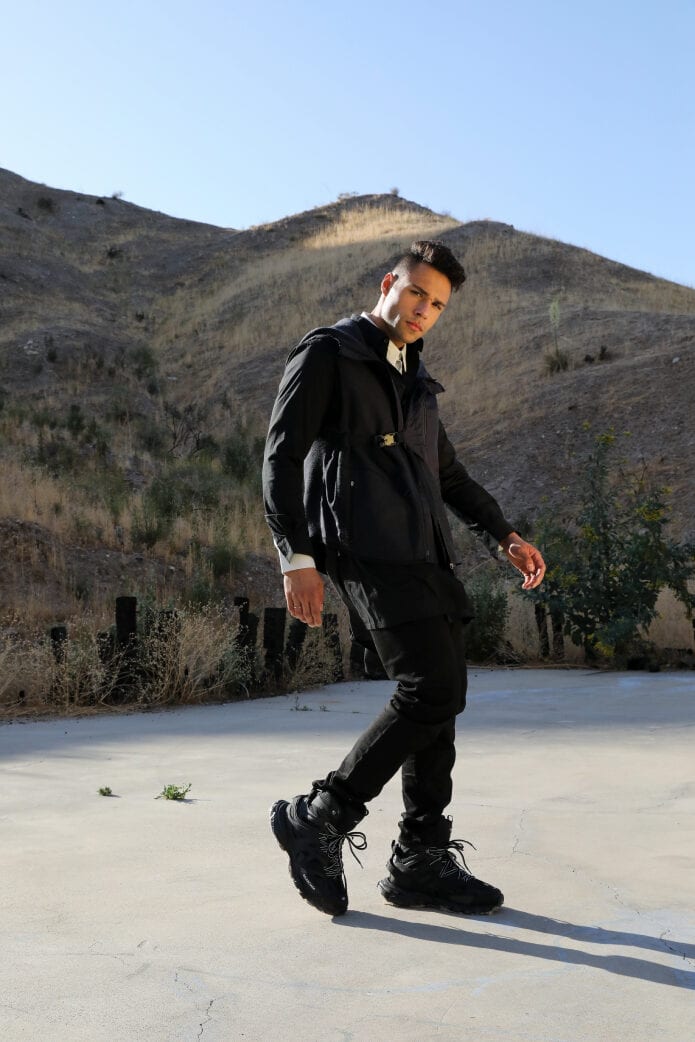
“I’m like, ‘Oh my god, if we ever need to pack up the writers’ room and find new writers for Tarlos, let’s just go to Tumblr or Twitter!’ That’s what stood out for me, how passionate everyone is and how supportive. Their desire to see this couple succeed, that says something.” Although he makes up one half of TV’s favourite first responder couple, Rafael refuses to take credit for Tarlos’ popularity. Instead, he redirects the conversation to the trailblazers who “harvested the fruits” long before him and paved the way for LGBTQ+ rights, as well as the content creators who persevered in the hetrenormative industry to make it possible for queer love to be mainstream on television. “This love and the representation that comes with being able to be fully out in the industry, playing an LGBTQIA+ character and being loved for your work and who you are, is one of those things that you can’t really claim to be yours,” he explains. “I can’t claim to have done all of this because I haven’t. It’s been a very long road to achieve this sort of acceptance, not only on screen but off screen. All of the work happened off screen. It was from forever to up until this point. I feel extremely lucky.”
This love and the representation that comes with being able to be fully out in the industry, playing an LGBTQIA+ character and being loved for your work and who you are, is one of those things that you can't really claim to be yours.
For Rafael, it’s been quite the journey to get to where he is now. Born in Belo Horizonte, Minas Gerais, Brazil, he immigrated to the United States when he was 13 years old. Hailing from a family of farmers in a “machismo” country, the star spent his days riding horses and herding cattle – rather than being confined to his room playing video games or watching television like his peers. Because of his lifestyle, Rafael wasn’t exposed to Western culture and the English language, which made his move to the States that more difficult. Rafael tells us that he completely “lost” his sense of happiness. “My reality changed. Naturally, I became a very introverted kid,” he recalls. “It felt scary to go outside, I didn’t recognise the smell of the street, I didn’t recognise the smell of the people, the way that they talked or the way that they walked. I also didn’t recognise much of my own family because we looked different in this setting.” With his life upended and his English-language skills limited, Rafael recoiled into “constant” survival mode. Having his guard up 24/7, however, resulted in disastrous consequences for both his physical and mental health. He reveals: “My mom gave me massages at the end of the day because I’d be so tense. I started losing my hair. My lips were, out of stress, almost colourless. One way that I occupied my mind was to study, to learn history and read. My thought as a 13-year-old was, ‘If I can understand how people think in this country and where they come from, then I can survive here. I can be here and earn the right to speak.’ I practiced, read a lot. Naturally, I didn’t associate with people. I didn’t like befriending people. That was very hard for me.”
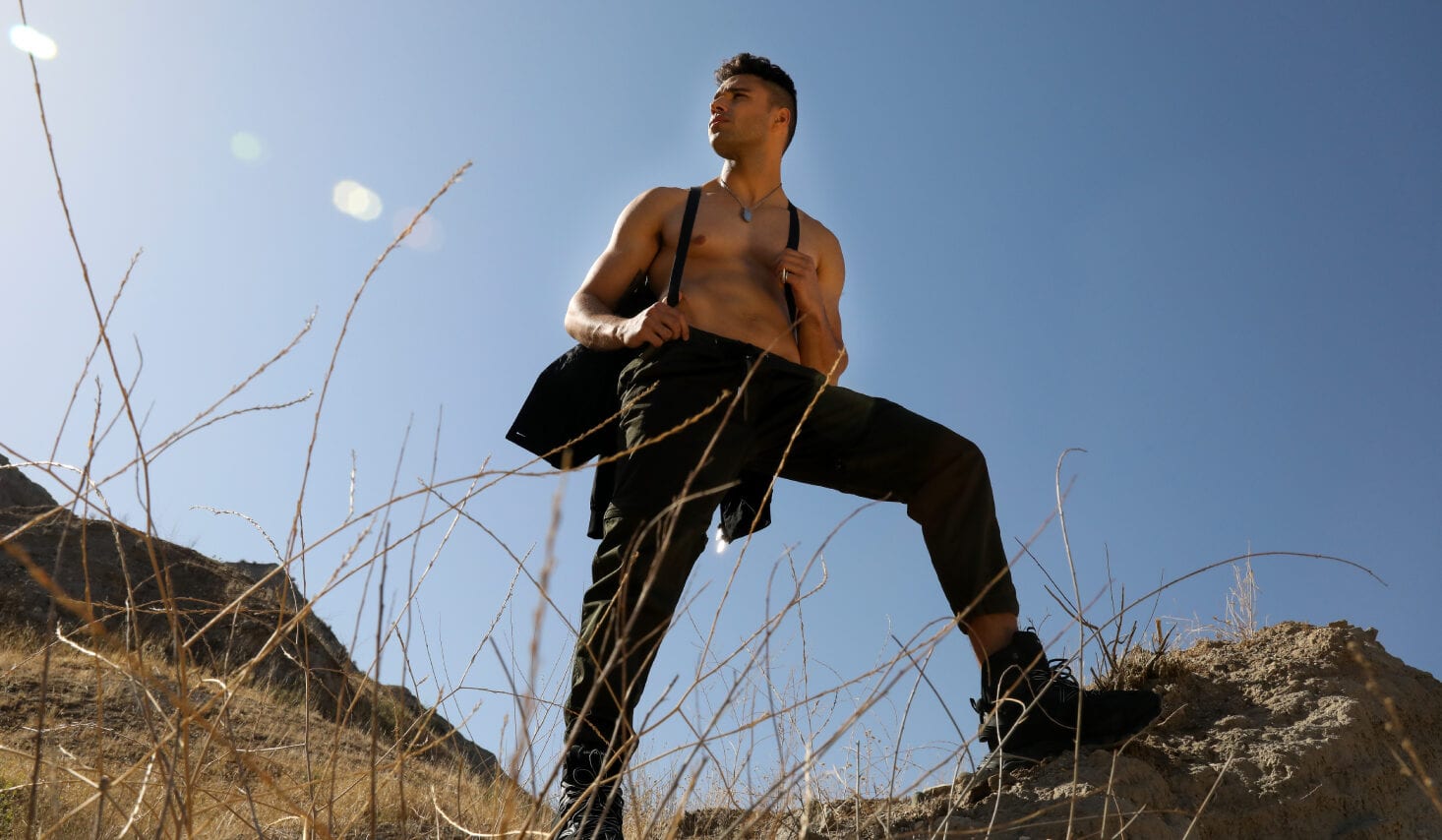
Being in class was especially difficult for Rafael. He hesitates before recollecting two incidents in his school years that had a profound impact on him at the time, as well as his trajectory in life. The first occurred three months after moving to the States in his computer class, where his name was pulled out of a hat – first, because of course? – to give a presentation. “Why was my name picked out first? Who knows?” he laughs, before his tone hits a more serious note. “I had to go up and make something of myself. At that moment I was like, ‘That was scary.’ Now I look back and think, ‘That has literally been what I’ve had to do for most situations in my life.’ If I ever encounter myself where I don’t know what I’m doing or what I’m speaking, if I don’t know the language – it doesn’t matter. Keep on going. That’s been my blood type: just keep on going and become it.” Rafael fast forwards to his junior year in high school when he was required, yet again, to stand in front of class for a presentation. He remembers it well, as it was dedicated to American poet and civil rights activist Maya Angelou. This incident was more severe than the last. “I lost my voice, started sweating and I decided, ‘I can’t live like this. I can’t do this.’ I was so embarrassed to be occupying a space without purpose. I said, ‘No, you’re not surviving anymore. You’re not fighting for your fucking life. If you face this storm, you’re gonna be in the eye of the hurricane, and you’re gonna deal with it.’”
I said, ‘No, you’re not surviving anymore. You’re not fighting for your fucking life. If you face this storm, you’re gonna be in the eye of the hurricane, and you’re gonna deal with it.’
Rafael composed himself in the bathroom afterwards and went back out into his school hallway, where he saw an audition notice for a production of Anne of Green Gables. It was at this particular moment that he decided to face the storm. At the time, however, Rafael was unaware of the intricacies behind the audition process, so his music teacher helped him memorise his lines with various monologues. Three days after his audition, the cast list was revealed and he discovered that he’d landed a part as Mr Sadler. This marked the start of Rafael’s journey to becoming a full-time actor. “I was right at the end with six lines, but I tried,” he remembers. “I take that experience for everything. ‘No. Speak. You’re here. Occupy this space. Occupy this energy that’s around you and take charge of that shit. You deserve it. It’s time.’ So, that’s why I started acting. I wanted to conquer this fear, but then who knew being exposed to acting would open many other things? The passion and how it makes me feel.”
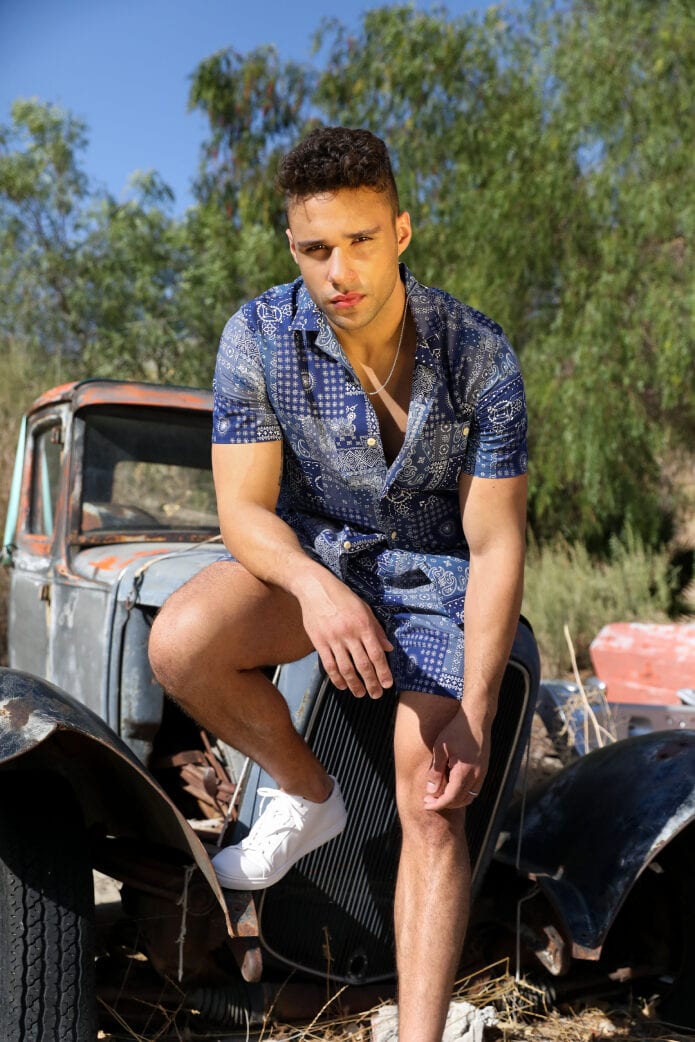
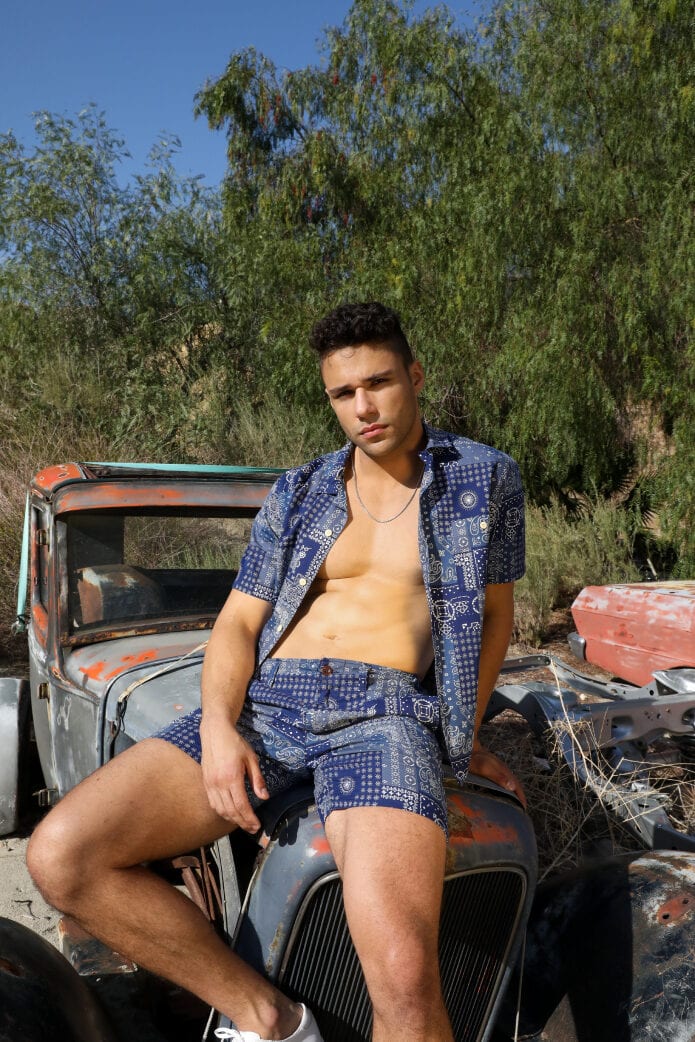
Rafael doesn’t take being in the public eye lightly. Take one quick glance at his Instagram profile and you’ll see a considerable amount of impassioned posts dedicated to raising awareness of various humanitarian causes from the Black Lives Matter movement to the rights of Indigenous people, as well as heartfelt tributes to LGBTQ+ activists and Stonewall pioneers Marsha P. Johnson and Stormé DeLarverie. In another, he dedicated the storyline of Tarlos to LGBTQ+ citizens in the States who are “not yet able to freely live in their true and beautiful skin”. When we ask Rafael if it was important for him to become a voice for marginalised communities, as well as act, he responds: “People want to see you and pay attention to you for whatever reason they have, maybe they’re attracted to you or admire you. If you have that power, why not utilise it for something such as bringing light to different types of people who don’t have the privilege of being seen or feeling seen? Why not do that?” Rafael’s performance on Lone Star has done just that. As Carlos, the actor has seen, first-hand, the impact the character has had on the many communities that he represents, from the LGBTQ+ community to the Latinx community and even the Texan community. Due to the instantaneous process of shooting the first few episodes of Lone Star, Rafael didn’t fully grasp that his character was representing all of the aforementioned communities “right off the bat”. As it marked his first consistent gig, Rafael was more focused on doing his job and doing it well. It wasn’t until he was inundated with powerful messages from viewers that he came to realise the significance of a character like Carlos on mainstream television and how his storyline resonates with people from all corners of the world.
I'm not representing a gay cop. That's my point of view as an actor, right? I'm not representing a gay Texan cop or a gay Latinx whatever, I'm just representing a person. He happens to be all of these things, beautiful things.
“I was already approaching my work with the respect and dignity it deserves, but it’s a whole different level nowadays with the immediacy of social media and technology, where you can send a message to a person you admire and hope they see it,” he says. “I see all of the messages. I don’t respond to all of them, because it’s a lot, just for my mental health sometimes, but I’m sincerely grateful. I appreciate it a lot that people reach out and voice their gratitude because I feel equally grateful for the fact that these communities feel seen without me trying to have them seen. I’m not representing a gay cop. That’s my point of view as an actor, right? I’m not representing a gay Texan cop or a gay Latinx whatever, I’m just representing a person. He happens to be all of these things, beautiful things. I think that’s why many people are able to identify with Carlos, or anyone in the cast really, because these are beautiful people that also happen to be many other things – as we all are in life, right? We’re not just one thing.”
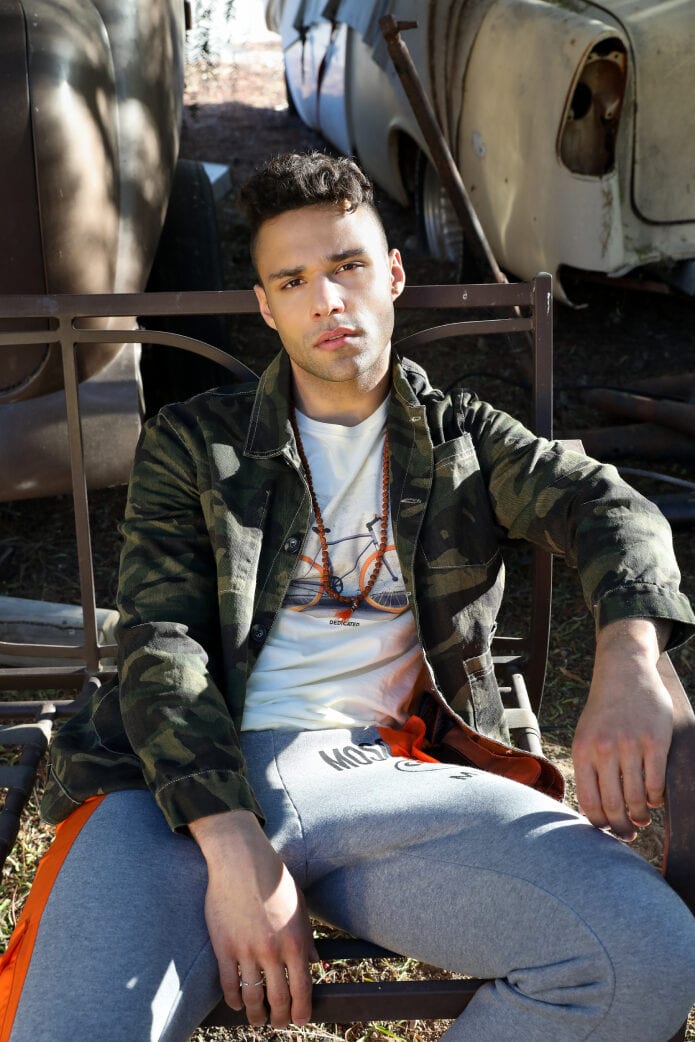
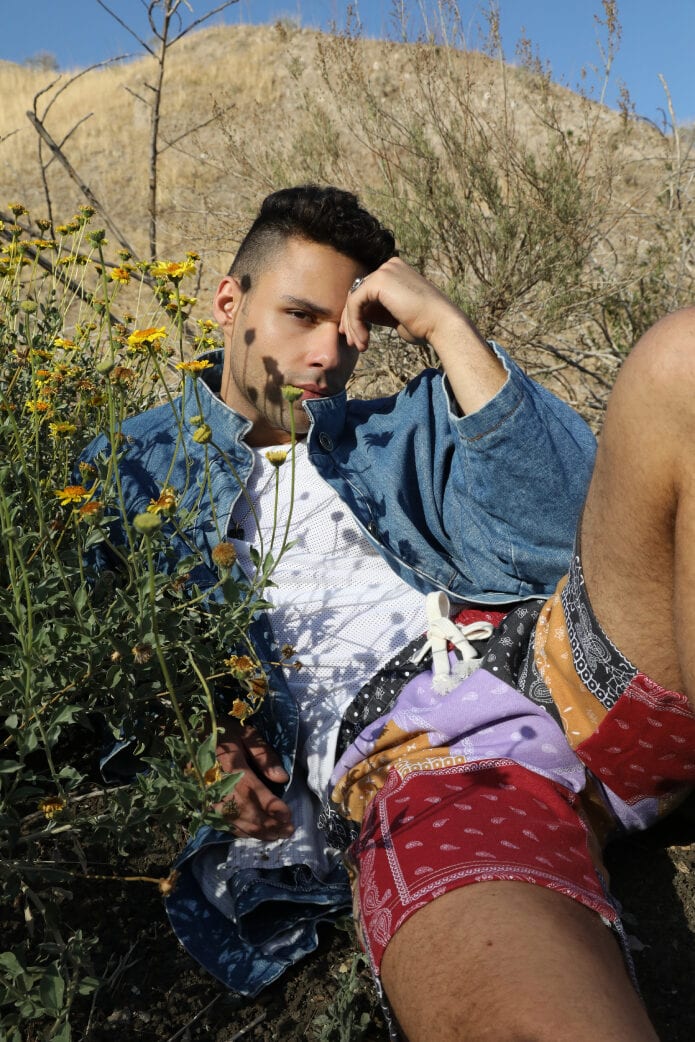
As our hour-long conversation comes to a close, we decide to do the Tarlos fans a solid and ask Rafael how he wants the romance to develop in the future. Wedding bells, perhaps? We can see the fan-fic now… “Selfishly, I hope to see Mr and Mr Reyes-Strand, Strand-Reyes,” he agrees. “I don’t know why this question is tripping me up! Who knows? I await many things for Tarlos.” One thing he doesn’t want to see, however, is for their relationship to end in tragedy and conform to the ‘Bury Your Gays’ trope, which sees queer characters facing more unnecessary torture than straight characters and, ultimately, dying. “Whenever a couple that looks like Tarlos meets and falls in love, there’s always a frickin’ tragedy,” he says with a sigh. “There’s always this stigma that no matter how much you fight to be in love, for your right to exist and to feel and be seen as legitimate, once you do achieve it and fall in love, then guess what? We’re gonna write a storyline where one of you dies! What are you telling parents that might not know what it feels like to have an LGBTQIA+ child? What are you telling friends or people that are not familiar with this world? If they are presented with the possibility of being shown a reality, we have got to do better than killing one of us at the end. What you’re also telling them is, ‘That’s what my trans daughter is going to live to see. Is she gonna die? Is she gonna suffer all of this? No, I’m not gonna let them express themselves the way they want to.’ They think they’re doing it out of love. They think they’re doing it out of protection. They grew up a certain way and think this is how it should be for them to survive in the world. When you’re presented with the opportunity where you’re able to create a storyline where these characters exist in a light of exuberance, brilliance and power – because all of us want to live in that reality – you give people the chance to dream, hope and aspire to be themselves. You also allow their allies to do the same, for themselves and for them.”
I think the dream role would be if I'm speaking for somebody, if I'm helping somebody, if there's an educational essence to the project itself and it's saying something, that's a dream role for me.
Right now, Rafael says he’s taking life one step at a time. Although he’s a permanent cast member on one of television’s most successful new dramas, he still identifies with the child who snuck out to the family computer at nightfall and watched YouTube videos of “gay men coming out” in order to feel seen. “This GAY TIMES photoshoot and interview feels lovely and I thank you for that, but at the same time I’m thinking to myself, ‘I’m also doing this for the little kid who hated his curly hair. I’m doing this for the kid that really disliked his body and skin tone,’” he explains. “This interview and photoshoot feels like a great challenge. I might have had the thought of, ‘Oh, this feels a little bit self-indulgent, I’m gonna take pictures of myself, blah blah blah,’ but I’m also like, ‘No, this is somebody who’s learned to live in his body and love his body, as well as his mind.’ That’s fine, that’s okay.” We leave the interview with one final question for Rafael, “Other than Lone Star, what would be your dream role?” After gushing over Viola Davis’ iconic performance as Annalise Keating in How to Get Away with Murder, Frances McDormand’s Oscar-winning role in Three Billboards and Thandwie Newton’s character in Westworld, the actor says he wants to continue creating art that makes a difference. “All of those roles were saying something. At the end of the day, this is a moment for us to educate the public. There are many people who, voluntarily or not, take what we create in front of the camera as legitimate enough to create their opinions based on that. I think the dream role would be if I’m speaking for somebody, if I’m helping somebody, if there’s an educational essence to the project itself and it’s saying something, that’s a dream role for me.”
